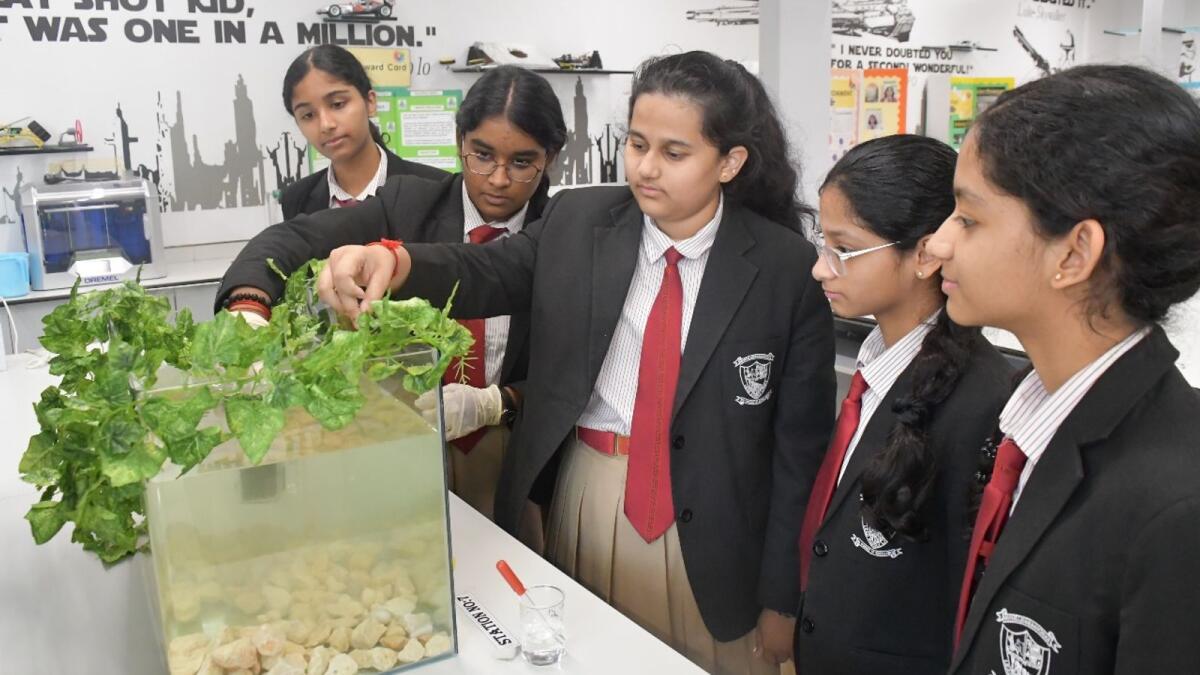
Dubai Students Invent Device That Can Save Fish, Coral Reefs As Ocean Water Changes
Last updated: Tue 2 Jul 2024, 5:37 PM
A group of Grade 10 students in Dubai have come up with a tool that can make the ocean less harsh for marine life, from fish to coral reefs.
The rising carbon dioxide levels in the atmosphere have been impacting not only the air we breathe but also our waters. Around 30 per cent of atmospheric carbon dioxide is absorbed by the ocean, leading to changes in acid levels that then impact the ecosystems underwater.
Stay up to date with the latest news. Follow KT on WhatsApp Channels.
While this environmental problem sounds complex, students at GEMS New Millennium School NMS have proven that they don't need a PhD to do something about it. They have developed Aquatral, a device that can balance out acidity in the ocean to create a safer home for marine life.
Explaining how this device works, Agnes Binosh, a student involved in the project, said:“The Aquatral device was conceived to combat oceanic pH imbalance caused by rising carbon dioxide levels. The concept was inspired by the need to find a proactive solution to counteract the negative effects of ocean acidification on marine life and ecosystems.”
In a nutshell, Aquatral carefully adds a base ocean waters to balance out acid levels.
“It is crucial that the device consistently neutralises acidity and proves its reliability over time. We reached out to a number of industry experts and incorporated their feedback to make further enhancements to our device," said Tarana Hari Krishnan, a student involved in the project.
Another team member, Alaina Manoj Mathew, said designing the device took up a significant part of the development process.
“We considered various aspects, including its size and precision in dispensing base solutions. This meticulous design phase aimed to create a device that can effectively address oceanic pH imbalance," she said.
"Following the design phase, we proceeded to develop prototypes of the Aquatral device. These prototypes underwent rigorous testing in controlled environments to evaluate their performance and efficiency."
How this device helpsThe pH sensors in Aquatral serves ensures only the specific levels of base are dispensed.
“This prevents excess addition of the base, sodium hydroxide, which would result in a higher pH level. Our aim is to create a neutralised medium in our oceans,” said student Alita Binosh.
“If this project succeeds, it could bring positive changes to coastal communities, fisheries, and businesses connected to the sea, boosting their economic and social wellbeing.”
By tackling the harmful effects of ocean acidification, the device becomes a tool to make marine ecosystems stronger and more resilient in the face of changes in the environment, Alita said.
The Aquatral can help the world meet Sustainable Development Goals 6 and 13.
Daya Arun, another student, said:“By neutralising ocean acidity caused by increase in industrial effluence and increase in carbon dioxide, it aids SDG 6 (Clean Water and Sanitation) by preserving marine ecosystems, agriculture and water quality. Additionally, by addressing ocean acidity, it indirectly supports SDG 13 (Climate Action) by curbing the adverse effects of acidification on marine life and ecosystems, which play a crucial role in regulating climate.”
Why ocean acidification should be tackledFor more than two centuries, starting from the Industrial Revolution, atmospheric carbon dioxide levels have increased due to fossil fuel burning and changes in land use. With the ocean absorbing a third of this carbon, the waters become more acidic.
Ocean acidification impacts global oceans, coastal estuaries, and waterways, crucial to economies reliant on fish and shellfish, which provide a primary protein source for many people worldwide.
Acidification diminishes some fish species' predator detection abilities, potentially endangering these organisms and disrupting the entire marine food web.
By maintaining balanced pH levels, marine life can be protected, including coral reefs, shellfish, and fish populations, which are vulnerable to the harmful effects of ocean acidification. This, in turn, supports the biodiversity of marine ecosystems.
Balanced pH levels are crucial for maintaining water quality, making it suitable for various uses, including agriculture and aquaculture.
ALSO READ:
-
Emirati student beats 700,000 others, crowned UAE Arab Reading Challenge champion
-
Sheikh Mohammed congratulates top UAE high school students
-
UAE ranked No.1 for creative thinking, financial literacy in Arab world
-
Visit from astronauts, talent shows: UAE schools 'power down' ahead of two-month summer break

Legal Disclaimer:
MENAFN provides the
information “as is” without warranty of any kind. We do not accept
any responsibility or liability for the accuracy, content, images,
videos, licenses, completeness, legality, or reliability of the information
contained in this article. If you have any complaints or copyright
issues related to this article, kindly contact the provider above.


















Comments
No comment